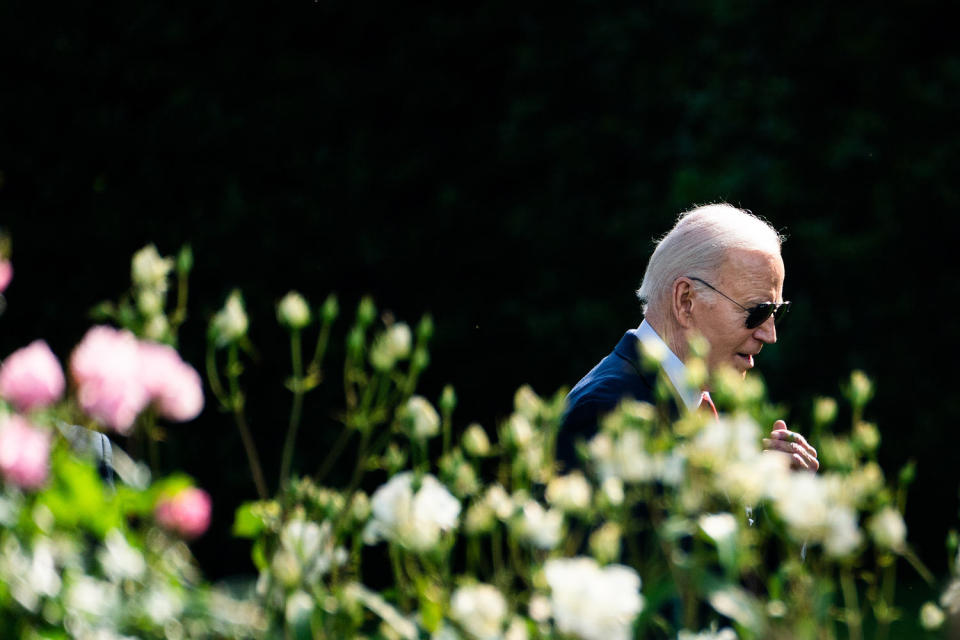Justice Department takes 'major step' toward rescheduling marijuana
- Oops!Something went wrong.Please try again later.
WASHINGTON — The Justice Department took a significant step toward rescheduling marijuana Thursday, formalizing its process to reclassify the drug as lower-risk and remove it from a category in which it has been treated as more dangerous than fentanyl and meth.
President Joe Biden announced the “major” move in a direct-to-camera video posted to his official account on X. “This is monumental,” Biden said in the message. “It’s an important move towards reversing long-standing inequities. … Far too many lives have been upended because of a failed approach to marijuana, and I’m committed to righting those wrongs. You have my word on it.”
The Biden administration has been signaling that it would move to reschedule the drug from Schedule I — a strict classification including drugs like heroin — to the less-stringent Schedule III, which would for the first time acknowledge the drug’s medical benefits at the federal level. The Drug Enforcement Administration submitted a notice of proposed rulemaking in the Federal Register on Thursday afternoon, triggering a 60-day comment period that will allow members of the public to submit remarks regarding the rescheduling proposal before it is finalized.
Too many lives have been upended because of our failed approach to marijuana.
So today, the @TheJusticeDept is taking the next step to reclassify marijuana from a Schedule I to a Schedule III drug under federal law.
Here's what that means: pic.twitter.com/TMztSyyFYm— President Biden (@POTUS) May 16, 2024
Biden first directed federal agencies to review how marijuana is scheduled in October 2022, weeks before that year’s midterm elections. The process was led by the DOJ and the Department of Health and Human Services.
“Look folks, no one should be in jail for merely using or possessing marijuana. Period,” Biden said in Thursday’s video, his third time speaking extensively on the topic since his directive two years ago.
The second time Biden addressed the issue was during this year’s State of the Union address, making history by referring to marijuana from the dais in the House chamber. “No one should be jailed for using or possessing marijuana,” he said at the time.
Vice President Kamala Harris also released a video Thursday, hailing the progress.
“Currently marijuana is classified on the same level as heroin and more dangerous than fentanyl. We are finally changing that,” Harris said. “We are on the road to getting it done.”
President Biden and I vowed to address injustices in marijuana policy.
Today, our Administration takes another major step forward. pic.twitter.com/GxFOFeU0DU— Vice President Kamala Harris (@VP) May 16, 2024
During the first 30 days of the comment period, interested parties could request a hearing regarding the rescheduling proposal. Under the statute, the DEA would be required to hold a hearing before an administrative law judge.
After the DEA reviews and considers the public comments, and at the conclusion of any requested hearing, the DEA will issue a final order to reschedule marijuana. (The DEA could decline to reschedule the drug but that’s unlikely given the administration’s strong support).
The entire process can take anywhere from a few months to up to a year.
Once completed, federal scientists will be able to research and study the potential medical benefits of the drug for the first time since the Controlled Substances Act was enacted in 1971. It could also open the door for pharmaceutical companies to get involved with the sale and distribution of medical marijuana in states where it is legal.
For the $34 billion cannabis industry, the move would also eliminate significant tax burdens for businesses in states where the drug is legal, notably removing it from the IRS code’s Section 280E, which prohibits legal cannabis companies from deducting what would otherwise be ordinary business expenses.

The Justice Department’s rescheduling decision could also help shrink the black market, which has thrived despite legalization in states like New York and California, and has undercut legal markets, which are fiercely regulated and highly taxed.
Dr. Kevin Sabet, president of the anti-marijuana legalization group Smart Approaches to Marijuana, blasted the decision. “It’s become undeniable that politics, not science, is driving this decision and has been since the very beginning. This decision won’t legalize marijuana, and it won’t release anyone from prison or jail,” Sabet said. “This is setting the stage to create the Big Tobacco of our time.”
During his time in office, Biden issued pardons for prior federal offenses of simple possession of marijuana and issued a proclamation granting additional pardons for simple possession, attempted simple possession and use of the drug.
The White House has also urged governors to do the same in their states and some have heeded the call, including in Oregon and Massachusetts.
Democrats in Congress are pursuing a partisan effort to remove cannabis entirely from the Controlled Substances Act, empowering states to create their own cannabis laws and prioritize restorative and economic justice for those affected by the “war on drugs.”
“Congress must do everything we can to end the federal prohibition on cannabis and address long-standing harms caused by the War on Drugs,” Senate Majority Leader Chuck Schumer, D-N.Y., said earlier this month.
This article was originally published on NBCNews.com

